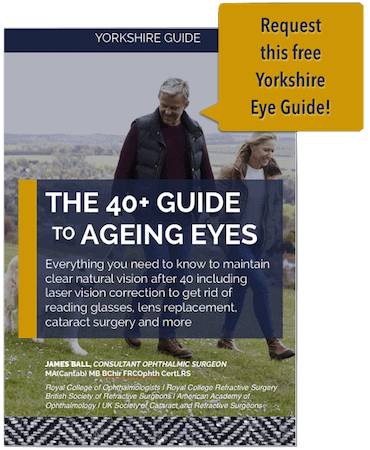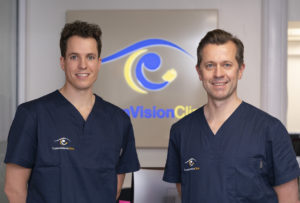What is a cataract, and how can fixing it be an opportunity?
A cataract is an opacity that develops in the crystalline lens of the eye. Early on in the development of age-related cataract the power of the crystalline lens may be increased, causing Short-sightedness (myopia), and the gradual yellowing and opacification of the lens may reduce the perception of blue colours. Cataracts typically progress slowly to cause vision loss and are potentially blinding if untreated.
Symptoms of cataracts
The lens in the eye can become cloudy and hard, a condition known as a cataract. Cataracts may cause blurred vision, dulled vision, sensitivity to light and glare, and/or ghost images.
Cataracts can cause sleep disturbance. Cataract reduces the amount of blue light entering your eye. The blue light is needed to stimulate special receptors in your eye which help to set your body clock which controls your waking/sleeping cycle.
Symptoms of cataract include
- Vision loss
- Short-sightedness (myopia)
- A reduction of the perception of blue colours
How would you know if you have a cataract?
You might have a cataract and not even know it. It's a gradual process; however, you may find that the quality of your vision will start to decline. You will usually notice this at night.
How does cataract surgery work?
James Ball discusses the mechanics behind cataract surgery and how it can restore your vision.
The lens of the eye can become cloudy and hard, a condition known as a cataract. Cataracts can develop from normal ageing, from an eye injury, or if you have taken medications known as steroids.
Cataracts may cause blurred vision, dulled vision, sensitivity to light and glare, and ghost images. If the cataract changes vision so much that it interferes with your daily life, the cataract may need to be removed.
Cataract surgery is the only way to remove a cataract.
You can decide not to have the cataract removed. If you don’t have the surgery, your vision loss from the cataract will continue to get worse.
Treatment of cataracts
At the Custom Vision Clinic, we see cataract surgery as an opportunity to create significant and long-lasting benefits for you. By using the latest technologies, many of our patients see better than they did, even before they developed the cataract.
If the cataract changes vision so much that it interferes with your daily life, the cataract may need to be removed. Cataract surgery is the only way to remove a cataract. You can decide not to have the cataract removed. If you don’t have the surgery, your vision loss from the cataract will continue to get worse.
The goal of cataract surgery is to correct the decreased vision that was caused by the cataract. During the cataract surgery, we remove the cataract with high-frequency ultrasound through a small incision and put in a new artificial lens called an intraocular lens or IOL.
Cataract surgery will not correct other causes of decreased vision, such as glaucoma, diabetes, or age-related macular degeneration. Many people still need to wear glasses or contact lenses after cataract surgery for either near and/or distance vision and astigmatism.
Results at a glance
My eyesight following the operation is brilliant and better than I thought possible, and this is all down to your excellent surgeon Mr James Ball and not to forget all the very dedicated people around him who make these operations possible.
Keith Garlick
Two of the best decisions I ever made in my life were firstly to have lens exchange and secondly to have Mr James Ball carry out my operation.
Patricia Walton
Within minutes I could tell there was a difference. But now, only a couple of months later, my sight is better than it was seven years ago! I can even read the really tiny print on the car sales ads! If you want that confidence you probably felt when you were younger, this is the ideal solution. Thanks to the treatment, I feel rejuvenated, independent and much younger!
John Hazelgreave
Many thanks for all your care and kindness. To me it appears a miracle that I can see so well. I feel very grateful. It is impossible to fully express my thanks.
Grace C.
May I offer grateful thanks for your expertise in operating on my eyes. It was intimated to me that you were the best, and from the results I am now enjoying, I am convinced that this is correct.
Jean D.
You are truly innovative. Thank you very much for curing the problems I have been having with my reading and near vision.
Sala M.
My work was becoming almost impossible. I had refractive lens exchange to both eyes with multifocal lens implants last July. I can now see better than 20/20 for distance and can read the tiniest print in newspapers - all without glasses! I have started reading for pleasure again, and I feel that my performance both at work and on the golf course has improved.
John
More Useful Information
Frequently asked questions about cataracts
Request a callback
I felt I was treated as an individual and all my questions were answered. From my experiences – I can highly recommend Mr Ball.
Our reviews on Trustpilot
Further information about eye conditions
Discover your eye treatment options
Give us a call on: 0345 643 0466
Or request a call back:





